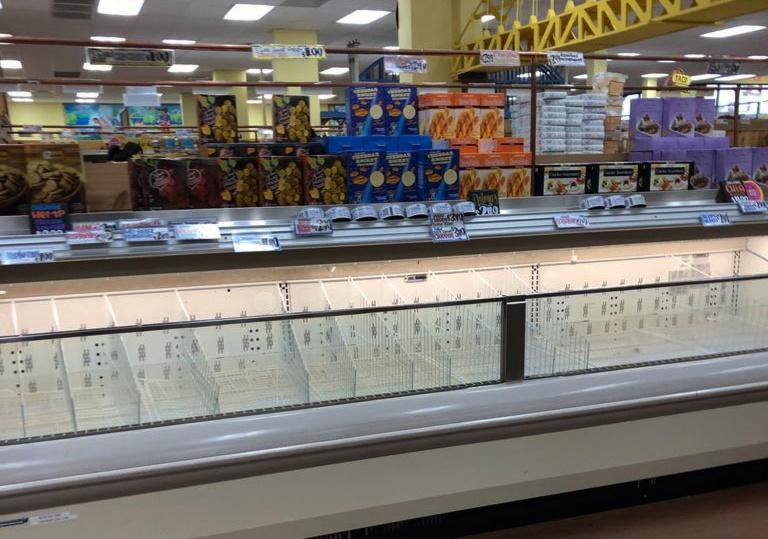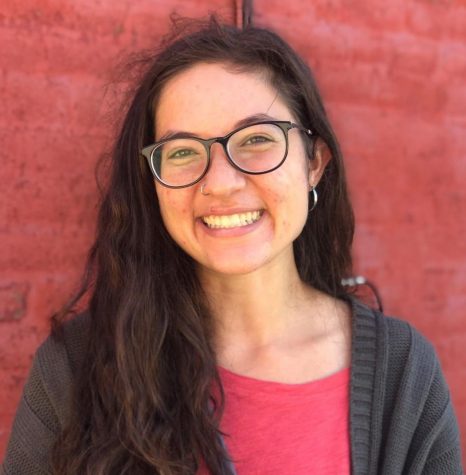Opinion | The harm in panic buying
An empty freezer section at Trader Joe’s.
March 18, 2020
If you live in Allegheny County, or anywhere else in the United States for that matter, God only knows what you’ll find. But here’s something you’re likely not going to find — toilet paper.
Panic buying in the time of COVID-19 has gotten so out of hand that stores are limiting the amount of products — such as hand sanitizer, disinfectant wipes, toilet paper and paper towels — that a single person can buy in a transaction. Grocery shoppers are also buying frantically, with some shelves emptying out before noon.
But you don’t need to buy $4,000 worth of toilet paper. You don’t need 17 different boxes of pasta — or 17 of the same boxes of pasta. You don’t need to panic buy, and by participating in panic buying, you’re putting vulnerable populations — who are already at a high risk amid this pandemic — at an even higher risk.
Psychologists conclude that panic buying is often born from the human need of control. Paul Marsden, a consumer psychologist at the University of the Arts London, said people panic buy in order to meet a need for control, a need for relatedness and a need for competence.
“It’s about ‘taking back control’ in a world where you feel out of control,” Marsden said. “More generally, panic buying can be understood as playing to our three fundamental psychology needs.”
And, there’s no evidence that the United States — or any other country hit hard by the COVID-19 pandemic — is in any danger of facing a nationwide food shortage, data suggests. The latest Agriculture Department data shows record-high stocks of food. The food industry itself is urging consumers in the United States to remain calm about food availability.
“This is a demand issue, not a supply issue,” Heather Garlich, vice president of media and public relations at FMI, the food industry association formerly known as the Food Marketing Institute, said. “The supply chain isn’t broken. The warehouses are pushing out as much inventory as possible in a 24-hour period.”
Reports show that there’s also plenty of toilet paper and other sanitary products. It’s just stocking the shelves that’s been a problem.
While many consumers may understand that there’s not much of a need to panic buy, some do so anyway, figuring that there’s no harm in following the crowd. The problem is there is, in fact, harm in following the crowd in this case.
First, panic buying puts grocery workers, retail workers and shoppers at a much higher risk for infection. The more people in one place, the greater the risk of the virus spreading — which is why the Trump administration has recommended gatherings do not exceed 10 people. And many employees working at grocery stores and cash registers are in the “high risk” group for contracting the virus and becoming seriously ill from COVID-19. The Centers for Disease Control and Prevention guidelines recommend working online and closing nonessential businesses to keep workers and the public safe.
But grocery stores are essential businesses, and many of the employees have no choice but to come in to work. Larger crowds make the shopping environment unsafe for them and for shoppers.
There’s also an element of privilege in panic buying, which assumes that all people have the means to stock up on weeks worth of groceries in one shopping trip. The reality is, many Americans don’t have the finances to do this, and when panic shoppers buy out the food, that leaves little room for low income shoppers — including, but not limited to, many elderly folk, college students and single parents who need to feed their children — to purchase affordable items.
In San Francisco, shoppers were panic buying baby formula and diapers, so much so that many shoppers who didn’t have the financial means to stock up on the essentials were having trouble finding them in stores. Though there isn’t a national shortage, stores were having difficulty restocking the formula.
“I’m so disheartened to hear about people going to buy diapers and wipes, or formula and can’t find any,” Facebook user Delaney Scantlebury wrote in a post to one local mothers group. “People, stop hoarding.”
The San Francisco Chronicle reported that clients showed up at the Homeless Prenatal Program in the area searching for infant formula, which was now out of stock, due to panic buying. The organization was also experiencing difficulty obtaining the formula and other baby products due to the panic buying, and because donations were dwindling.
We’re living in a time of uncertainty and stress. It’s natural to panic. But sometimes, it’s good to sit with the stress and think through purchasing decisions — who we’re hurting and who we could be putting at risk. Let’s show up for each other, even if that means showing up in small ways, like limiting panic buying.
Leah writes primarily about books, writing and the spices of the world. Write to Leah at [email protected].




